Yes, you can use Propane Heaters Indoors. You just have to make sure that you use only “Indoor Propane heater” indoors. For indoors and outdoors, propane heaters are made differently. Thus, you must use the propane heater indoors which is specifically made for indoors.
Propane heaters are commonly used to provide warmth indoors in the winter season. However, to use them you must consider some safety factors because any natural-based heaters come with some risks such as Kerosene heaters and propane heaters. We will discuss everything in detail in this article.
Propane heaters emit carbon monoxide gas which is dangerous for us. But, unlike Kerosene heaters, propane heaters have higher combustion efficiency due to which the emission of CO gas is comparatively very low. Thus, these heaters are considered safe to use with little care. At least, they are much safer than Kerosene heaters.
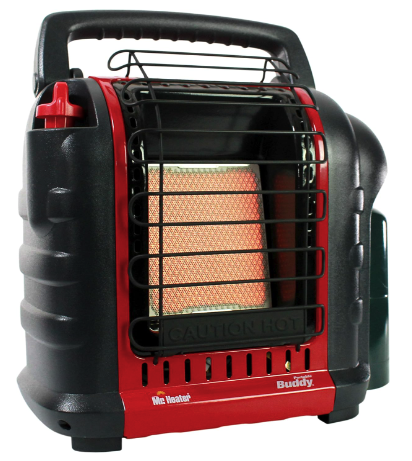
What is Propane?
Propane is a hydrocarbon gas(C3H8) that is commonly used as a fuel for various applications, including heating, cooking, vehicle fuel, and industrial processes. Although it is a gas, it is stored as liquid in pressurized cylinders. This is an odorless and colorless gas.
Propane Heaters use Propane as a fuel which burns to generate heat which makes your house warm in chilly winter. Only the risk with the propane heater is the emission of CO gas which generally happens when any petroleum-based fuel burns. But, with some safety measures propane heaters can be used without any issue.
Types of Propane Heaters
Since we are talking about Indoor Propane heaters, we will discuss this only in this article. Indoor propane heaters come in various forms, and models for specific heeds.
- Ventless Blue Flame Heaters
- Vented Wall Heaters (Direct Vent)
- Vented Gas Stoves and Fireplaces
- Propane Wall Furnaces (Gravity and Forced Air)
- Radiant Propane Heaters
- Convection Propane Heaters
- Propane Water Heaters (Tankless)
- Portable Cabinet Heaters (Indoor)
- Propane Space Heaters (Various Models)
- Propane Radiators
On a general basis, Portable and wall-mounted indoor propane heaters are quite popular. Where portable heaters can be moved from one room to another, wall-mounted propane heaters are permanently installed in one place.
Why We Must Not Use Outdoor Propane Heaters Indoors?
Outdoor Propane Heaters are designed for open spaces and they generate more heat. Thus, the emission of CO is also high. But, since they are made to be used outdoors, they are not dangerous if used outdoors as the fresh air outside balances the oxygen levels in the space. Because of their usage outdoors, they generally don’t come with safety features such as CO Detectors, Oxygene depletion sensors, Auto Shut-off features, etc.
So, when you use an outdoor propane heater indoors, the high emission of CO, and too much heat will make things uncomfortable inside, and the more CO emitted, the more dangerous it will be for you.
Here I am summarizing this as why you must not use outdoor propane heaters indoors:
- Carbon Monoxide Poisoning: Outdoor propane heaters are not designed with the same safety features as indoor heaters. They produce higher levels of carbon monoxide (CO), which is dangerous for humans. CO poisoning can lead to symptoms like dizziness, nausea, confusion, and, in severe cases, and in extreme situations it can lead to death as well.
- Incomplete Combustion: Outdoor heaters are optimized for open-air environments and may not burn propane efficiently in indoor spaces. Incomplete combustion can produce not only CO but also other harmful byproducts which could be life-threatening.
- Oxygen Depletion: Outdoor heaters do not have oxygen depletion sensors (ODS) or may not have them configured for indoor use. ODS are crucial safety features in indoor propane heaters which shut off the heater if oxygen levels drop below safe levels inside the room.
- Fire Hazards: Outdoor heaters may not have the same fire safety features as indoor models. They may not be designed to prevent contact with combustible materials that are commonly found indoors. This can increase the risk of fires or burns.
- Regulatory Violations: Using outdoor propane heaters indoors typically violates safety regulations and building codes. It may result in legal and safety consequences that may include penalties.
- Liability and Warranty: Using outdoor heaters indoors may void any warranties, and in case of accidents or damage, it may increase your liability.
Safety Precautions While Using Propane Heaters
If you are using indoor propane heaters to make your house warm, you must know it uses propane which is a petroleum product, and when it burns some dangerous gases may emit. Thus, it comes with some risks. That is why, you must be careful and consider safety to prevent accidents and health risks.
Here are essential safety precautions to follow when using indoor propane heaters:
- Ventilation: Ventilation is something you must be careful about while using petroleum fuel-based heaters. If you are using the propane heater inside your room, make sure there is some ventilation that lets fresh air come inside because when the propane burns to generate heat, oxygen levels dip in the space, and CO gas is also emitted. Thus, having some ventilation helps fresh air come in and keep the oxygen levels balanced. If there is no ventilation, you may be suffocated by CO gas when your heater works for a longer duration.
- Choose the Right Heater: Select an indoor propane heater designed for your specific space size. Avoid using oversized heaters that can lead to overheating and inefficiency. Follow the manufacturer’s recommendations for heater sizing based on the size of the indoor space where you want to install your heater.
- Keep Clearances: Maintain proper clearances between the heater and combustible materials such as curtains, paper, clothing, etc. Check the manufacturer’s guidelines for minimum clearances, and never block airflow around the heater. Generally, 3-4 feet is a good distance to keep the combustible materials from the heater.
- Install Carbon Monoxide Detectors: Install carbon monoxide detectors near sleeping areas. So that, when CO levels are up, you will be notified. Generally, a good indoor propane heater comes up with CO detector which when detects too much CO level indoors, shuts off the heater.
- Regular Inspection: Periodically inspect the heater for signs of damage, corrosion, or wear. Check for loose or damaged hoses, connections, and valves. Ensure the heater is free of dust and debris.
- Follow Manufacturer Instructions: Always follow the manufacturer’s instructions for installation, operation, and maintenance. Adhering to these guidelines is crucial for safety and efficient operation.
- Use Approved Fuel: Since it is a propane heater that uses propane as fuel, make sure to only use propane. Do not substitute other types of fuel, as this can lead to malfunctions, fires, or explosions.
- Keep It Away from Children and Pets: Keep children and pets away from the heater to prevent accidental contact or burns. Use safety barriers or screens if necessary.
- Unattended Operation: Do not leave the heater unattended while it’s operating. Turn off the heater when you leave the room or go to bed. Yes, this is not a type of heater that you can use while you sleep.
- Proper Ignition: Use the built-in ignition system or a long-reach lighter designed for the heater for safe ignition. Do not use open flames or matches to light the heater.
- Emergency Shut-Off: Familiarize yourself with the emergency shut-off procedures in case of gas leaks or other emergencies. Know how to turn off the propane supply and the heater itself.
- Regular Maintenance: Perform routine maintenance as recommended by the manufacturer. This may include cleaning, replacing filters, and having the heater professionally serviced at regular intervals.
- Proper Storage: If the heater is not in use for an extended period, disconnect the propane tank and store it in a safe, well-ventilated area away from direct sunlight and heat sources. If you have portable propane heater, and you want to move from one room to another, make sure you move it when it is not in use. Yes, you must switch it off, and once it cools down, then move it.
- Know the Local Safety Guidelines for Using Heaters: Stay informed about local safety regulations and guidelines for propane heater usage. Adhere to any specific requirements or permits if applicable.
When NOT to Use Propane Heaters Indoors?
It’s quite an important thing to identify the situations and environments where using propane heaters indoors is not advisable. Small, poorly ventilated spaces or areas with sensitive occupants, such as infants or the elderly, may not be suitable for propane heater use. These situations may pose an increased risk of carbon monoxide poisoning or fire hazards.
Things to Consider While Choosing Indoor Propane Heaters For Your House
Now since you know a lot about Indoor Propane heaters, and their safety considerations, it is important to know about the things to consider when you are going buy the heater for your house.
Here are a few pointers you must consider:
- Heating Capacity: You must determine the size of the space you want to use the heater for. Choose a heater with an appropriate heating capacity for the space to effectively warm the room without overworking the unit or causing overheating. If the space is bigger, you just need a heater with higher capacity. But, if the space is small, a low heating capacity heater will work out well too. Thus, it is important to know the heating capacity of the heater you are buying, so that you can get an idea whether it is good for the space.
- Type of Heater: Consider the type of indoor propane heater that suits your space and requirements. Options include blue flame heaters, convection heaters, radiant heaters, and wall-mounted units. Each type has its advantages and may be better suited for specific room layouts.
- Ventilation Requirements: Be aware of the ventilation needs of the heater. Some indoor propane heaters require proper room ventilation to prevent carbon monoxide buildup and ensure safe operation.
- Safety Features: Check for built-in safety features like oxygen depletion sensors (ODS) tip-over switches, and CO detectors. ODS monitors oxygen levels in the room and shuts off the heater if the oxygen levels drop too low.
- Tip Over Switches: Tip-over switches cut off the heater if it’s accidentally knocked over.
- Portability: If you need to move the heater around different rooms, consider a portable model with wheels or handles for easy transportation. If you want to fix it in one place, Wall Mounted Propane heater will be better.
- Ignition System: Choose a heater with a reliable and convenient ignition system. Some models have electronic ignition, while others require manual lighting with a long-reach lighter or match.
- Fuel Efficiency: Look for a heater that offers good fuel efficiency, as this can save on propane costs in the long run. High-efficiency models are designed to maximize heat output while minimizing fuel consumption.
- Thermostat and Temperature Control: Having a thermostat and temperature control settings allows you to maintain a consistent and comfortable indoor temperature. This can help prevent overheating and optimize energy usage.
- Noise Level: Always consider the noise level because a noisy heater will irritate you. I have been in this situation. I have had a heater in my house which was too noisy. Thus, I can really say, that get the one with low levels of sound. A quiet heater is good to get.
- Installation and Mounting: Determine whether the heater requires professional installation or if it can be easily installed by the homeowner. Wall-mounted heaters may need mounting brackets and secure placement.
- Warranty: Always check the warranty of the heater model you are buying. I believe that heaters are one of the most fragile appliances because of heating, they wear out soon or start having some issues. So, having a longer warranty period saves you costs on repairs or replacement.
- Safety Compliance: Ensure that the heater complies with safety standards and regulations applicable to your region. Check for safety certifications such as CSA (Canadian Standards Association) or UL (Underwriters Laboratories).
- Cost: Cost is always something to consider. Choose the one that is efficient for your heating needs, and at the same time that is cost-effective as well.
Conclusion
With this detailed content on Propane Heater, I would conclude that, yes you can use Propane heaters indoors while considering safety concerns. Moreover, this is a petroleum fuel-based heater, it must not be used while you sleep. Use it when you are there in the room. You must not leave it unattended.

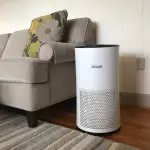
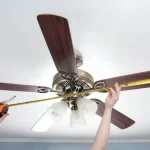
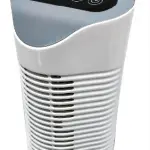
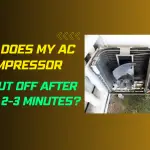


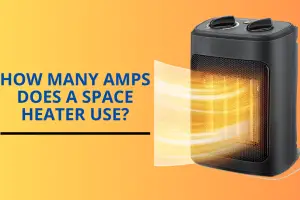

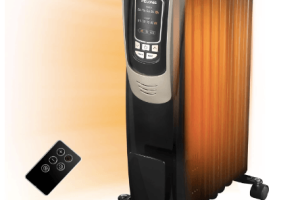
Add Comment